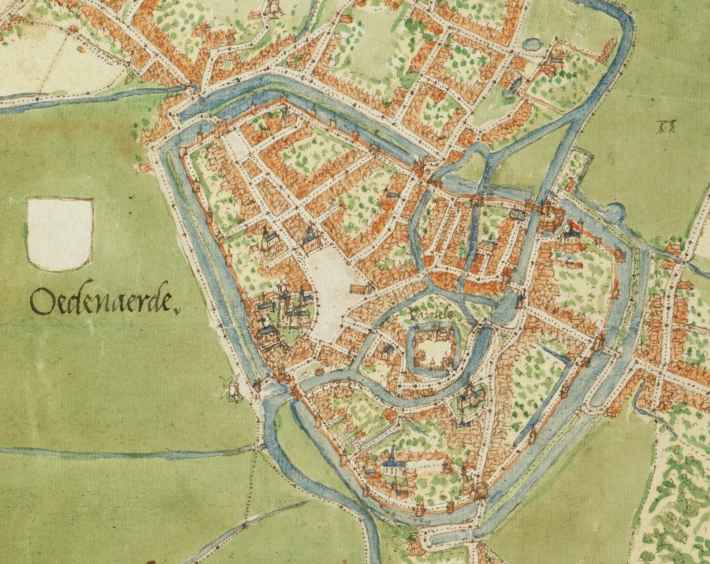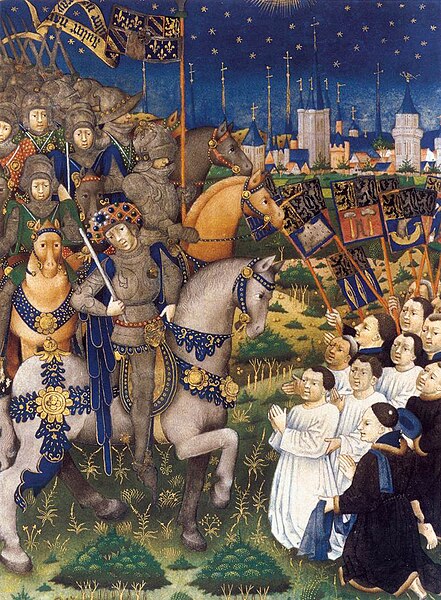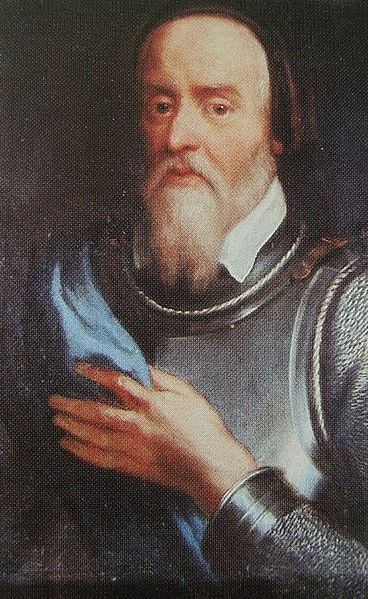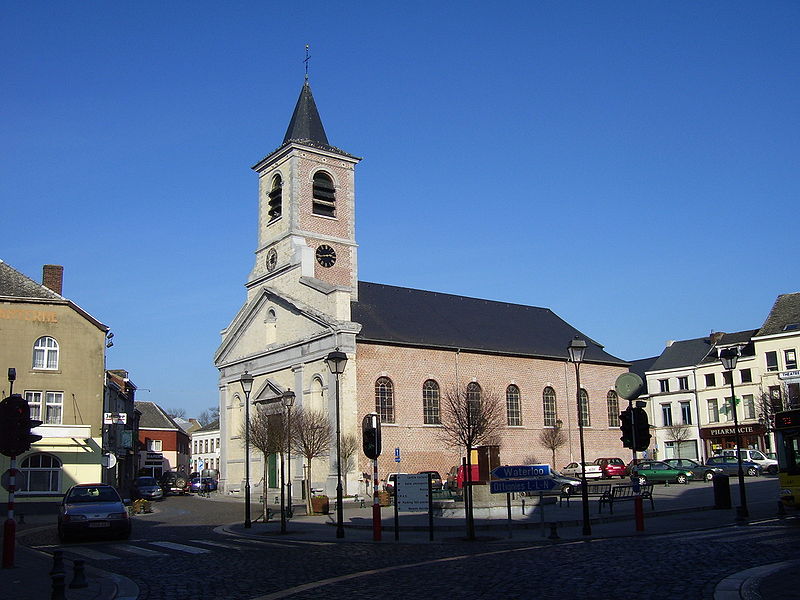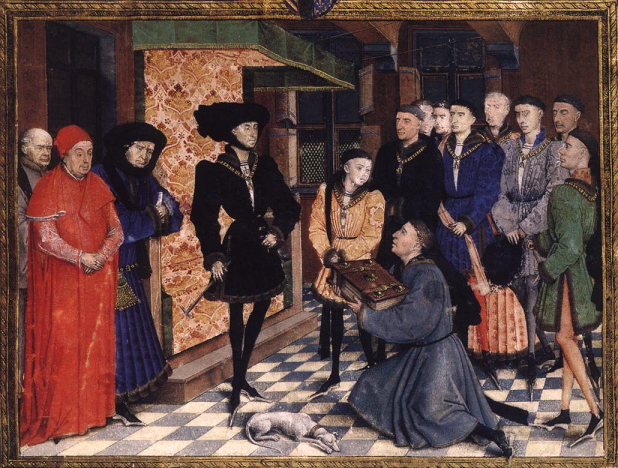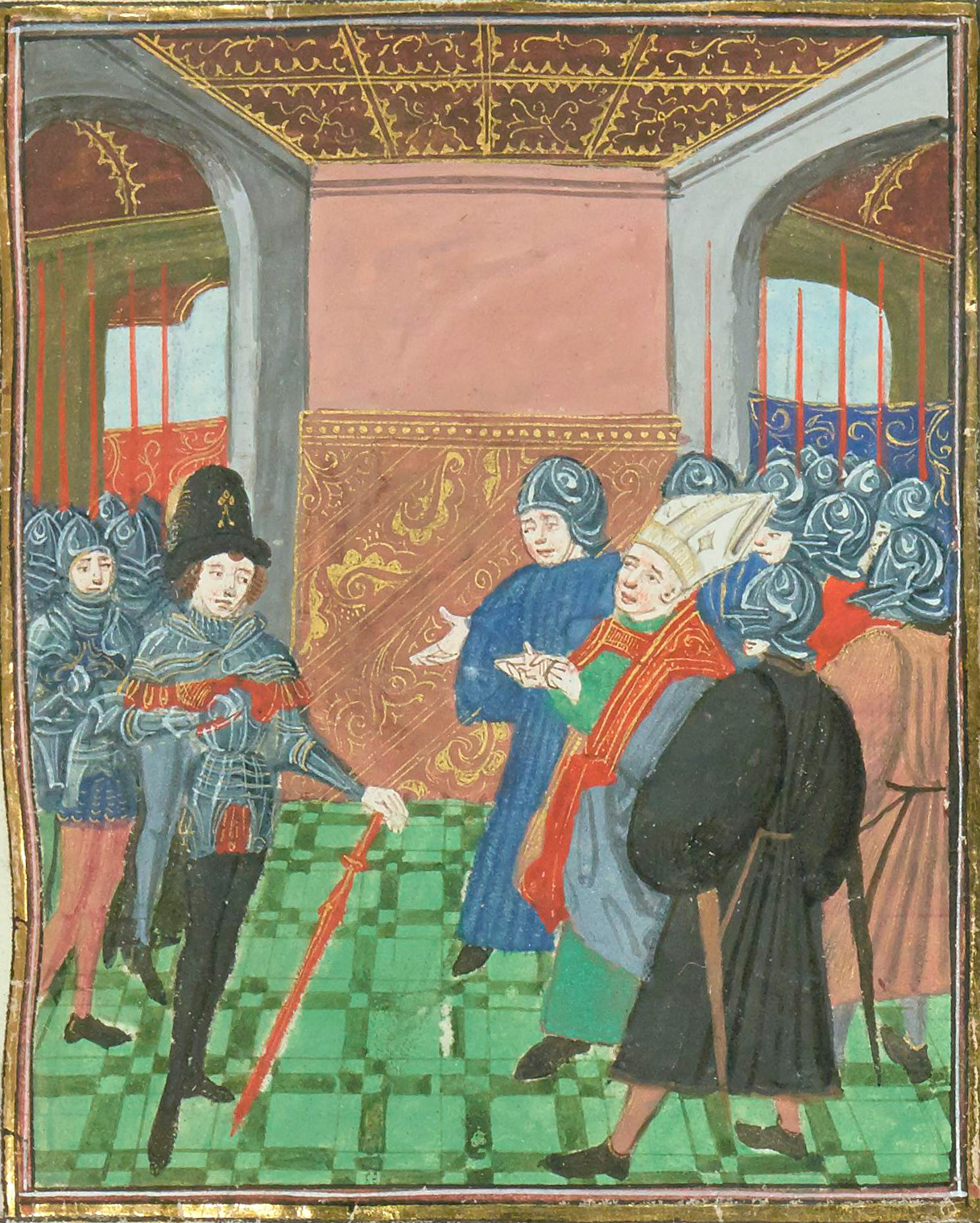 |
| Philip the Good |
Philip the Duke
Philip was
unimaginably rich; he was probably richest man of his times not to wear a
crown. Not only did he have, among other residences, his palace in Brussels,
the Prinsenhof in Bruges, the ducal palace in Dijon, the castle at Hesdin in Artois, a residence in Lille, but the family’s
Hôtel d’Artois was kept ready for his infrequent visits to Paris.
Philip’s
court in Brussels was the repository for much of Philip’s wealth held as
jewellery and plate. According to one visitor, Leo of Rozmital, the contents of Philip’s treasure
chests would take three days to inspect. The principal items were worth 110,000
crowns[i]. The list included
‘A clasp with King Richard’s
device of a stag, ornamented with twenty-two large pearls, two square balais[ii],
two saphires on one side and a ruby, with a large square diamond the size of a
hazel-nut.’[iii]
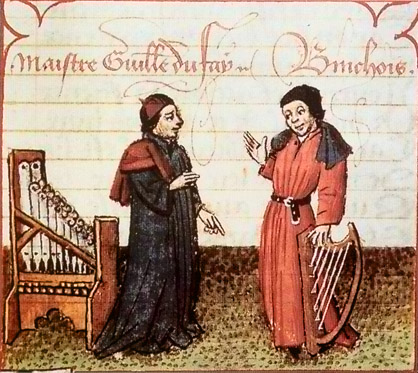 |
| Gille Binchois (R) |
The
treasures were both for general use; Philip daily used a gold goblet with a
lid, and for pawning when Philip needed to fund an army. In May 1456 many of
the treasures were put on public display in Holland when rumours abounded that
Philip could not afford to pay an army to conquer Utrecht.
Philip was a
patron of the artists Jan van Eyck, who was his valet de chambre, and Rogier van der Weyden, but preferred tapestries of which
he had an inordinate number. One such tapestry still survives in part; ‘the
History of Gideon and the Golden Fleece’[iv] by Jehan le Haze. The
composer Gille Binchois was Philip’s chaplain and Robert Morton and Guillaime Dufay were also in Philip’s employ. The poet Michault Taillevent was his joueur
des farces.
Philip the Man
Philip was
not a morning person and often slept in late. He had a papal dispensation to
hear mass in the afternoon not the morning. Parisian chronicler Jehan Maupoint
commented;
‘It is noteworthy that the
duke heard mass every day between two and three o’clock in the afternoon. This
was invariably his habit, for he stayed up at night almost till dawn, turning
night into day to watch dances, entertainments and other amusements all night
long….it was said that he had a dispensation to do this.’[v]
 |
| Notre Dame de Boulogne |
Philip gave
alms to the poor and made pilgrimages much like any other rich noble, visiting
Notre
Dame de Boulogne at least 12 times. Like others of his station Philip had
a mobile chapel designed to be carried on a wagon when he took to the field.
Despite the munificence of his table Philip was a moderate eater.
The main
activity of the Burgundian court was falconry and hunting. By 1463 Philip
employed a master-falconer, three falconers and three assistants. Only the
master was fully employed and the others took turns at serving at court; the
falcons were based in Philip’s northern territories. The ducal hunt was based
in Burgundy and in 1427 the master-huntsman had a budget of £2,000[vi].
Philip owned
one of the greatest libraries of illustrated books of the time containing over
1,000 books[vii]. He enjoyed reading
romantic literature and farces. He was not a great talker but when he spoke it
was to the point; his surviving letters show that he had a sense of humour that
he showed to his close relatives. Philip was always polite to women, claiming
that they ruled over 39 households out of 40.
Quarrels
_-_Portrait_of_Isabella_of_Portugal.jpg/475px-Rogier_van_der_Weyden_(workshop_of)_-_Portrait_of_Isabella_of_Portugal.jpg) |
| Isabella of Burgundy |
For most of
his life Philip enjoyed good health but in June 1458 Philip fell ill with a
fever after playing tennis, losing consciousness for 36 hours. Early in 1462 he
again fell ill and his son and heir and his wife were summonsed to his sickbed.
They begged him to take sustenance. The flurry of doctors who attended the duke
insisted on bloodletting and demanding that Philip have his head shaved to
speed on his recovery. He refused to do so until all his courtiers had shaved
their heads.
Philip’s
life was saved by the Duke of Milan’s doctor, Luca Alessandro who was accompanying a Milanese
embassy. Philip began to recover from his illness during the spring, although
he was still quarrelling with his son about the de Croy family. Philip’s bouts
of illness were becoming worryingly frequent and he required the attendance of
his wife when he was ill.
On 22nd
July 1462 Philip appointed his son as his representative in Holland. Charles
went to visit the state his father had made him responsible for during August
and September. He did not stay long as he was concerned that Philip would
depart on crusade leaving his lands in the care of someone other than himself,
or that he might be disinherited. In 1463 Charles negotiated with the Dutch for
his recognition as Philip’s heir in the Netherlands, exacerbating the quarrel
between himself and his father.
In an
attempt to create harmony between Burgundy and France Philip agreed to sell back
the French towns in the Somme that Charles VII had given him in 1435. In 1461
Charles VII’s death meant that Louis was now king of France and Philip had high
hopes of his nephew. Louis agreed to pay Philip 400,000 livres[viii] for the return of the
lands, a further cause of discontent between Philip and Charles who strongly
disagreed with the agreement.
In February
1464 Louis asked Philip to postpone his crusade; if the negotiations with the
English to end the war failed Philip would be needed to fight shoulder to
shoulder with France. Louis wrote to Philip urging that;
‘It would scarcely be
honourable for him to help…..others to recover their kingdoms from the Turks
while leaving the kingdom of France open to an attack from the English who have
done more harm here than the Turks in the lands they have conquered.’[ix]
Philip had
always taken Charles VII and Louis as men of good faith. He failed to
understand that their aim was to reinsert the Burgundian lands back into the
kingdom of France, with Philip as a vassal rather than an independent prince. Charles
did not make that mistake.
Death of a Duke
 |
| Charles the Bold |
Charles and
Philip were reconciled in Lille in June 1464 but it was not until the September
that Charles finally gained ascendancy in the Burgundian court when a relative
of the de Croy family[x] was arrested for seeking
to kill Charles in Gorinchem. On October 7th Philip
left Hesdin, where he had spent most of the year, just before Louis was due to
arrive. It took Charles a further six months to bring about the downfall of the
de Croy family. From then on the policy of Burgundy was increasingly hostile to
France.
Charles was
in the policy driving seat from this point on, but Philip still ruled his domains.
He retained the use of his faculties until shortly before his death in Bruges on
15th June 1467.
‘At two o’clock after
midnight a quantity of phlegm gathered in his throat and he was so troubled by
this that it seemed he would die then….he was in great difficulty and soon
afterwards developed a high temperature which continued from 6.0 am on Saturday
until Monday when he gave his soul to God.’[xi]
Philip was
much mourned by many of his subjects but they were blinded to his many faults.
Philip failed to create an effective state machinery to administer his
territories and was content to be advised by men who did not have the best
interests of Burgundy at heart. Philip allowed himself to be bullied by the
French monarchs and allowed the de Croy family to create a state within the
state.
Bibliography
Europe –
Norman Davies, Oxford University Press 1996
The
Fifteenth Century – EF Jacob, Oxford University Press 1997
Louis XI –
Paul Murray Kendall, Sphere Books Ltd 1974
Isabel of
Burgundy – Aline S Taylor, Madison Books 2001
Philip the
Good – Richard Vaughan, Boydell Press 2014
Charles the
Bold – Richard Vaughan, Boydell Press 2002
www.wikipedia.en
[i]
In 2015 the relative: historic standard of
living value of that income or
wealth is £76,070,000.00 labour earnings of
that income or wealth is £578,100,000.00 economic status value of that income or wealth is £2,628,000,000.00 economic power value of that income or wealth is £47,370,000,000.00 www.measuringworth.com
[iii]
Philip the Good - Vaughan
[v]
Philip the Good - Vaughan
[vi]
In 2015 the relative: historic standard of
living value of that income or
wealth is £1,521,000.00 labour earnings of
that income or wealth is £12,250,000.00. economic status value of that income or wealth is £43,330,000.00 economic power value of that income or wealth is £767,200,000.00 www.measuringworth.com
[viii]
In 2015 the relative: historic standard of
living value of that income or
wealth is £312,500,000.00 labour earnings of
that income or wealth is £2,498,000,000.00 economic status value of that income or wealth is £10,120,000,000.00 economic power value of that income or wealth is £183,500,000,000.00 www.measuringworth.com
[ix]
Isabel of Burgundy - Taylor
[x]
Sent by Louis
[xi]
Philip the Good - Vaughan
